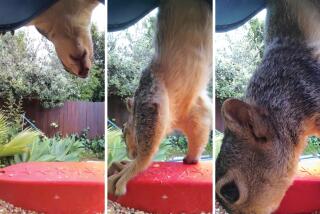When There’s a Mouse in the House, It’s Fair to Grouse
- Share via
This is how it starts: You’re in the kitchen on the phone. You hang up, and as you turn to leave the room, you catch a blur out of the corner of your eye. Was that a creature scurrying across the kitchen floor or just the play of the light against the tile?
You can’t be sure.
But soon, very soon, the evidence mounts. Those tiny telltale black pellets, the chewed up bag of dog kibble. Not us, you pray, that would just be too disgusting. And then one day, in plain view, a furry lump leaps out of the cupboard and scurries under the fridge. You don’t scream, because you don’t want to scare your child, who takes one look at the pest and shrieks with delight: “Look, Mom! A mouth wan undah the wefwigewatah!”
At first, you are blown away because you had no idea your child could say a five-syllable word. Euphoria soon gives way to revulsion. Because now you have to face the unpleasant fact: If your kitchen were a restaurant, the health department would shut you down faster than you could say “Chuck E. Cheese.”
*
This is the truth: When I saw the first mouse, I thought it was cute. It was gray and fuzzy and tiny. Hanta virus was the furthest thing from my mind.
When my husband saw it, he was angry and disgusted and murderous. He talked about stepping on it the next time it dared show its whiskers.
Revolted by the thought of bloodshed, I inadvertently masterminded a criminal conspiracy. “Let’s get some traps that don’t kill them,” I pleaded. “Then we can release them in that field down the street.”
“OK, fine,” he said. “We’ll just let them live since they’re so cute.”
This is a dirty fighting technique of his that works every time. “I didn’t say don’t get rid of them,” I said. “I said, ‘Let’s trap them humanely.’ ”
“Humanely? Are you out of your mind?” he said. “These are vermin, not humans.”
“Why do you think they call it the Humane Society?” I sputtered. “It’s an adjective that refers to how the animals are treated!”
“Can we talk about grammar later?” he asked coolly. “I need to go buy some traps.”
He returned with your basic flat mousetrap, the kind that dispatches them instantly to the great kibble bag in the sky.
I argued for something less final.
Glue traps, it turned out, were a terrible idea. You can’t release the mice and they die a slow, awful death unless you dispatch them by hand or drown them.
We renewed our commitment to flat traps. Over the course of the next few days, with every nocturnal Snap! we discovered we did not have a couple of mice. We had at least a dozen of them.
Each morning, my husband rose with vigor and bounded into the kitchen to check the traps. “Don’t look under the sink, honey,” he’d say chivalrously, as he plopped yet another stiff catch into the garbage. “Avert your delicate gaze.”
My brave warrior, Dances With Mice.
*
Some facts about mice:
* The all-gray “house mouse” is not known to carry the deadly hanta virus (that honor goes to the white-bellied deer mouse), but it is known to make a mess by urinating and defecating up to 18,000 pellets a year (wouldn’t you just love to know who counted?). Says Richard Wightman, an L.A. County deputy agricultural commissioner: “This will cause an odor problem if nothing else.”
* Poison is not the preferred removal method, especially when you have children and pets in the house, Wightman says. Poisoned critters can expire in walls, making removal impossible. Then you’re dealing with another odor problem, even worse than the first. The best way to keep them out of your life is to seal your house from the outside, he says. They can come in through holes as small as a dime.
* Cats are undependable killers--too many variables, such as age, enthusiasm and attitude.
* Mice proliferate after it rains, says John Heyning, curator of mammals at the county Natural History Museum, because more insects and more plants mean more mouse food.
* Technically, you would be committing a crime if you trapped a mouse in your home and released it in a nearby field. According to Dan Lehman, a warden in the Department of Fish and Game, moving a wild animal is a misdemeanor, punishable by a fine of up to $2,000 and/or up to a year in county jail. Lehman wants to make one thing perfectly clear, however: “We’re not out there patrolling for great mouse capers. The law was designed to prevent the release of detrimental animals, like coyotes or ferrets.” (Please, no angry calls from the Ferret Liberation Front.)
* Mice are not cute. “Everyone has the Disney perspective of what rats and mice are like,” Wightman says, “but the real world is quite different.”
*
Next week: Has “Charlotte’s Web” reduced arachnophobia? An exterminator’s lament.
More to Read
Eat your way across L.A.
Get our weekly Tasting Notes newsletter for reviews, news and more.
You may occasionally receive promotional content from the Los Angeles Times.











